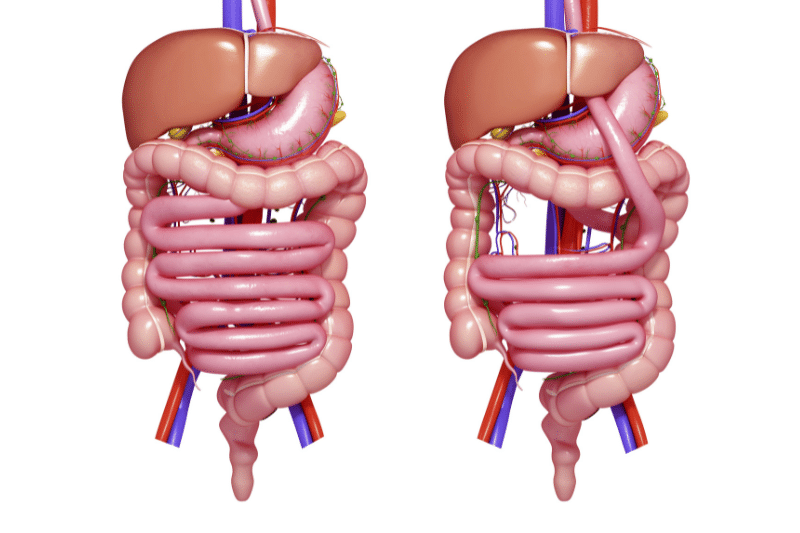In this article, we will discuss what is gastric by surgery or stomach surgery. Consequently, its purpose, types of weight loss done, and recovery time for gastric sleeve surgery. Regardless, considering gastric sleeve surgery this post will give you comprehensive insights. To decide on which surgery you should consult for.
Weight loss procedures are called bariatric surgeries or metabolic surgery. The term bariatric surgeries describes obesity surgery and its effect on the patient’s weight and also the metabolism. Minimally invasive surgical techniques have fewer risks and are super effective for obesity surgery and diabetes treatment. This surgery can prevent future diseases. Patients who are prone to weight gain are more likely to live healthy after their first bariatric surgery.

Types of Metabolic and Bariatric Surgery
Indeed, each procedure has its benefits and risks. Not to mention the choice of procedure depends on individual factors and health conditions.
Sleeve Gastrectomy
Laparoscopic sleeve gastrectomy, also known as Gastric Sleeve. Removes a big chunk of stomach tissue. As a result, the other part shaped like a banana. Although, it involves removing a big part of the stomach and leaving a tube-shaped part. Eventually, this smaller stomach can’t hold as much food as the size before.
Roux-en-Y Gastric Bypass (RYGB)
The surgeons perform gastric bypass surgery, connecting the stomach directly to the small intestine. In fact, commonly referred to as the Roux-En Y Gastric Bypass. Since 1993, the first laparoscopic technique approaches refined. It’s a well-performed operation that is super effective in reducing obesity-related diseases. It’s an old French phrase meaning “Y” in its shape.
In this metabolic and bariatric surgery procedure, the surgeon divides the stomach into a small upper pouch and a larger lower part. Then the small intestine rerouted to connect to both. This reduces the amount of food in the remaining stomach part. Finally, the small intestine can hold enough weight and decrease nutrient absorption.
Biliopancreatic Diversion with Duodenal Switch (BPD/DS)
BPD-D abbreviated as biliomatopancreatic dilution with a Duodenal switch. Starts by creating an elongated stomach pouch similar to a gastric sleeve surgery or gastrectomy. It looks much like a full gastric sleeve or bypassed stomach, where less small intestinal space is needed. This complex procedure involves removing a part of the stomach and bypassing a big part of the small intestine. This reduces calorie and nutrient absorption significantly.
Adjustable Gastric Band (AGB)
Gastric band surgery or gastric banding known for food restriction. Bariatric surgery is now the only way to treat individuals with excess body weight. Particularly, don’t have a good diet, exercise, or medication. Adjustable gastric band surgery involves staples or bandings. To divide stomachs into 2 parts. One small pouch contains about a pound of food.
Made of silicone, the surgeon places it at the top of the stomach to prevent food from entering. Precisely, around the upper part of the stomach to create a small pouch. It’s available in the US since 2001. It has little effect on most types of weight loss or gain and obesity-related diseases. Their use slowed down over a decade. This limits the amount of food the stomach can hold and makes you feel full sooner.
Single Anastomosis Duodeno-Ileal Bypass with Sleeve Gastrectomy (SADI-S)
The Single Anastomosis Duodean iliac bypass with Sleeve Gastrectomy – SADI-s or SADI-E is the latest treatment. Finally, approved by the US Metabolic Surgery Society. Although similar to the PDS-D, the SADI-S is simpler with no surgical small intestine connection.

How do surgeons perform sleeve surgery?
Most sleeve surgeries are either using a laparoscopic surgery technique or robotic surgery. The surgeons perform the procedure through small incisions to open up your abdomen so recovery is easier. Although some individuals may benefit more from abdominal surgery in general depending on their condition.
What happens before sleeve surgery?
After you complete your screening and sleeves, the next step is liquid nutrition. The doctor will give you an exact guide to follow. It’s to remove excess fat from your abdomen and liver so it will be easier for the surgeons. You must not drink alcohol during the entire 12-hour procedure. You should keep your stomach empty. Food and liquid in your stomach can cause side effects.
When weight loss surgery doesn’t work?
There are many reasons. Weight loss will happen after you implement the lifestyle changes. Evidently, having high-calorie solid foods will not lead to rapid weight loss. To lose weight you have to change the way you eat to maintain optimum health and regular physical fitness. Besides this, make sure to schedule every appointment after weight loss surgery. So your two doctor’s practices can monitor your progress. However, if you experience a decrease or complications in losing weight even after the weight loss surgery. Then contact your surgeon right away.

Gastric Bypass Overview
Who is a candidate for Gastric Bypass Surgery?
Certainly, bariatric procedures are recommended for individuals with excess body mass index or weight. Precisely, a body mass index (BMI) of 40 or higher or those with a BMI of 35 or higher with health conditions. Such as high blood pressure, diabetes, or sleep apnea. Eventually, the goal of metabolic and bariatric surgery to achieve significant and sustainable weight loss. While reducing severe obesity-related health problems and improving overall health. You can calculate your BMI.
Pre-Operative Care and Instructions
Before surgery, surgeons will recommend you to follow a 2-week liquid diet. To further prepare your body open surgery and remove fat from your abdomen and liver. You will also need to fast for 12 hours before the procedure to keep your stomach empty.
Surgical Procedure
The bariatric surgeon laparoscopically performs the robotic bariatric surgery procedures. Particularly through small incisions and faster recovery. However, the procedure involves creating a sleeve-shaped stomach pouch removing a portion of the stomach. Then connect the pouch to the small intestine.
How long is the recovery time for gastric surgery?
Immediate Post Surgery Recovery
Recovery time varies depending on the procedure:
-
Hospital Stay – Most patients stay in the hospital for 2-3 days.
-
Initial Recovery – The first week is pain management and a gradual increase in activity.
Long Term Recovery
-
6 Weeks – Most patients can go back to normal activities in 4-6 weeks.
-
Dietary Adjustments – Gradual transition from liquids to solids over several weeks.
-
Physical Activity – Depending on the healing, surgeons will suggest an exercise program suitable to your body type.
Life After Gastric Bypass Surgery
Some people lose more weight just enough weight, up to 70% of their excess weight in 2 years of losing weight alone.
Diet and Nutrition After Surgery
Firstly, in the short term, you will need to follow a strict diet. Moreover, only healthy foods allow the stomach to heal. Later, after a few months, you can start to eat normal food. But you will still need to make healthy food choices. Additionally, take vitamins and supplements for life to ensure proper nutrition.
Lifestyle Changes and Support
Secondly, you will need to make lifestyle changes for life. Including regular exercise, healthy eating, and lifestyle habits. You may also need to attend support groups and follow up with your doctor to monitor your progress and concerns.

Metabolic and Bariatric Surgery – Gastric Surgery FAQS
What are the types of gastric surgery?
-
Restrictive Procedures – Reduce the stomach size (e.g. gastric sleeve surgery, gastrectomy, gastric banding).
-
Malabsorptive Procedures – Alter nutrient absorption (e.g. biliopancreatic diversion).
-
Combination Procedures – Combine both restrictive and malabsorptive elements (e.g. gastric bypass).
What is gastric surgery for?
-
Weight Loss – To help individuals lose a significant amount of weight.
-
Health Improvement – To improve or resolve obesity-related health conditions.
-
Quality of Life – To enhance overall quality of life by increasing mobility and reducing weight-related limitations.
How Serious is Gastric Bypass Surgery?
It has numerous benefits and potential risks. You need to weigh these carefully:
-
Benefits – Significant weight loss, improved quality of life, reduced blood sugar and medication needs.
-
Risks – Surgical complications, nutritional deficiencies, and need for long-term lifestyle changes.
Possible complications:
-
Infections – Post-surgical infections can occur.
-
Blood Clots – Risk of blood clots formation.
-
Nutritional Deficiencies – Patients often need supplements, due to the reduction in nutrient absorption.
What is the best gastric surgery for stomach reduction surgery?
-
Gastric Bypass – For those who want to lose weight need it to lose weight more rapidly. Additionally, they need to improve in metabolic conditions.
-
Sleeve Gastrectomy – For those who prefer less complex abdominal surgery, with less pain and good outcomes.
-
Adjustable Gastric Banding – For those who want a reversible and adjustable gastric band surgery, gastric sleeve or band surgery-only option.
-
Biliopancreatic Diversion – For patients with severe or morbid obesity and related health conditions.

What happens in Gastric Surgery?
Gastric surgery involves several steps:
Preoperative Preparation
-
Medical Evaluation – Medical assessment and necessary tests.
-
Dietary Guidelines – Pre-surgery diet to shrink the liver.
The Surgery
-
Anesthesia – The medical team will administer the local or general anesthesia.
-
Procedure – The bariatric surgeon will do the chosen gastric surgery which takes 1-3 hours.
Postoperative Care
-
Monitoring: Close monitoring in the recovery room.
-
Pain Management: Medications to manage pain and discomfort.
How much weight can you lose with gastric surgery?
Weight loss surgery results vary depending on the surgery and the individual’s adherence to lifestyle changes:
-
Gastric Bypass – 60-80% of excess weight loss.
-
Sleeve Gastrectomy – 50-70% of excess weight loss.
-
Gastric Banding – 40-50% of excess weight loss.
-
Biliopancreatic Diversion – 70-90% of excess weight loss.
Factors that Affect Weight Loss:
-
Diet and Exercise – Adherence to dietary guidelines and regular physical activity.
-
Medical Follow-Up – Regular check-ups with the healthcare team.

What is the most common gastric surgery?
The most common gastric surgeries are:
-
Gastric Bypass – Most performed due to its effectiveness in weight loss and metabolic improvement.
-
Sleeve Gastrectomy – Becoming popular for its simplicity and good outcome.
-
Adjustable Gastric Banding – Preferred for its reversibility and adjustability.
What are the other abdominal surgeries?
Apart from gastric surgeries, other common abdominal surgeries are:
Appendectomy – Removal of the appendix.
Cholecystectomy – Removal of the gallbladder.
Hernia Repair – Repair of hernias in the abdominal wall.
Colectomy – Removal of part or all of the colon.
What is a major surgery for the stomach?
Major stomach surgery involves major alteration to the stomach or surrounding organs:
Gastric Bypass – Major surgery with extensive rerouting of the digestive system.
Biliopancreatic Diversion – Involves major changes to both the stomach and intestines.
Gastrectomy – Partial or total removal of the stomach, often for cancer treatment.
Why would a person need stomach surgery?
Gastric surgery treats many co-related health conditions. Individuals may need stomach surgery for these medical conditions:
-
Metabolic Disorders – Type 2 diabetes, increased blood sugar, high blood pressure, hypertension, sleep apnea, and metabolic syndrome.
-
Digestive Issues – To treat severe acid reflux, stomach acids, gastrointestinal problems, or gastric ulcers in some cases.
-
Severe Obesity – For individuals with a BMI of 40 or higher. Or a BMI of 35 or higher with serious medical conditions. To lose significant weight when other methods have failed.
What is stomach surgery called?
Gastric Bypass – Roux-en-Y gastric bypass.
Sleeve Gastrectomy – Vertical sleeve gastrectomy.
Gastric Banding – Adjustable gastric banding.
Biliopancreatic Diversion – Duodenal switch surgery.
What is the surgery to reduce stomach size?
Surgeries to reduce stomach size are:
Sleeve Gastrectomy – Removes a large part of the stomach, leaving a sleeve-shaped section.
Gastric Bypass – Creates a small stomach pouch and bypasses part of the small intestine.
Gastric Banding – Uses a band to create a small stomach pouch.

What does IBI Healthcare do for stomach surgery?
Gastric bypass and other metabolic and bariatric procedures can be life-changing for many. Knowing about the size, types of surgery, recovery and outcomes is key to making a decision. Gastric surgery with our board-certified bariatric surgeons involves:
-
Preoperative Preparation – Medical evaluations, blood tests, and dietary guidelines.
-
Surgical Procedure – Under general anesthesia, the surgeon performs the procedure.
-
Postoperative Care – Monitoring, pain management, and gradual reintroduction of soft foods with fewer calories and nutritional supplements.
Furthermore, call us or book a teleconsultation. To further inquire about metabolic and bariatric surgery detail pricing and insurance coverage. Also, find out how to get to your own rapid weight loss and health goals.










